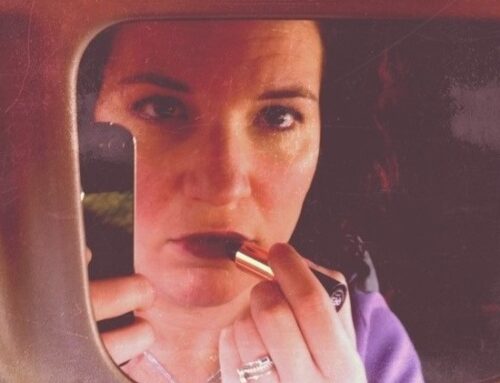Unless you’ve been under a rock lately – and hey, I wouldn’t blame you if you were – you’ve probably been hearing lots about the television series Ted Lasso. The show follows the quirky and cheerful Kansas football coach to England, where he coaches a different kind of football. The show has won many fans with its optimism, heart, and, well, Roy Kent. But what has also rung true for many viewers are the portrayals of mental illness in the show – especially during the second season. Though there are many amazing characters, it is perhaps Ted Lasso himself who provides the most honest picture of mental illness.
Panic attacks
Ted’s panic attacks began near the end of the first season of the show. But we see him experience more of these during the second season. I suspect anyone who has had a panic attack recognized immediately what was happening in these scenes. Panic attacks often result in a rapid heartrate, shortness of breath, dizziness, and a feeling of overwhelm. During the attacks Ted has, you hear the sound of whatever is happening around him muffle, while there’s a pounding noise like his heart. The room may spin, and Ted clearly has some trouble breathing. While it would be difficult to completely mirror the experience of a panic attack just through a television show, Lasso gets damn close.
More importantly, Rebecca’s response to Ted is practically the perfect way to help someone. Reassuring someone, helping them breathe, and staying with them until the attack has passed are all great actions to take.
Therapy – ish
The show’s approach to therapy is also very powerful and feels extremely honest at times. Ted’s initial resistance to therapy is sadly not that uncommon for someone from the Midwest. As a Kansas gal myself, we still believed it was mostly people in California and New York who had therapists while I was growing up. Seeing him sit down with Dr. Fieldstone – and sit down, and sit down – was a refreshing glimpse at how therapy isn’t a one-and-done solution. And the fact that he has another panic attack even after starting therapy allows us to understand that he’s not “fixed” just because he’s seeing a therapist.
I say therapy-ish here, though, because for many of the players on the team, one session is all they need. I don’t know what sort of magical cure Dr. Fieldstone is handing out in her sports therapy sessions, but I’d like me some of that, please. We don’t quite know yet where Ted’s character is headed in season three, but I’ll be disappointed if we don’t see some indications that Ted is still learning to manage his mental health.
How people respond to Ted Lasso and mental illness
After Trent Crim breaks the news about Ted’s panic attack in The Independent, we see Ted walking to work. On his way, a neighbor and shop owner asks him – in a very overly tender way – if he’s doing okay. We see a couple pass him and begin whispering very clearly about him. And we see one of his consistent critics degrade him – but then follow it up by telling him to take care of himself. I honestly found this scene so perfect, that it was almost hard to watch. As someone who has been very vocally “out” about her mental illness for many years now, I’ve experienced every single one of these reactions. The way the writers encapsulated this experience within a short walk down the street was spot on and pure magic.
“…the way we discuss and deal with mental health in athletics”
The wait between the last two episodes of season two was absolutely nerve-wracking for many of us. At the end of episode 11, we discover that Ted’s panic attack will be in the newspaper the next day. We know to expect Ted to be dealing with the repercussions of this in the final episode of the season. The show could have taken a dramatic turn for the worse in that single episode. Ted responds to questions from the press with “overall concern about the way we discuss and deal with mental health in athletics.” I admit, this had me cheering in my living room.
His response makes good sense when champion athletes are becoming more vocal about their mental health and self-care. Still, it seemed far from a sure bet. When a panic attack is still news in the fictional world of Ted Lasso, we can’t be sure there won’t still be some stigma exhibited around mental illness.
Room for improvement
It’s virtually impossible for a show to get every single thing right. Lasso gets most things right when it comes to talking about mental illness, but there’s still a little room to grow. Since we still have another season coming, I don’t want to count the show out yet.
One of the hardest scenes to watch in this recent season was Ted’s conversation with Dr. Fieldstone where he talks about his father’s death by suicide. He refers to his father as “quitting” on him and his mother. This is absolutely a common way to respond to the death of a loved one who dies by suicide. That being said, it still implies that suicide is a choice. Similar to death from a physical illness, death by suicide is truly a result of intense mental illness. Those who don’t understand what it feels like to have a mind experiencing depression and suicidal ideation may see it as a choice, but it truly isn’t. In my dream world, this show – and other media that deals with suicide – would start to acknowledge this.
Waiting for season three
If you’re looking for a good representation of mental health in television, this is definitely a show to watch. I’m looking forward to seeing where the show takes us in season three.
For those of you that have been watching, what do you think about the portrayal of mental illness and mental health in the show so far?
* Ted Lasso ornaments in image were designed and stitched by me.






